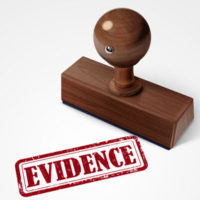Is Handwriting Analysis Admissible Evidence?

In 2000, a woman named Susan Berman was found dead with a gunshot to the back of the head. Shortly after the murder, an anonymous individual sent a card to the police telling them that there was a body in Berman’s home. She was found, but her murder remained unresolved, as there was no physical evidence to match to a suspect. However, in 2004 Berman’s stepson, “The Jinx,” found some letters in her possessions from Robert Durst, Berman’s friend and colleague. The Jinx brought them to the police, and after a thorough handwriting analysis of the letters and the card, experts determined that the samples were a match. Furthermore, Durst’s letters revealed the same misspelling as the note to the police: Beverly Hills: “Bevereley Hills.” The letters indicated that their friendship was not so friendly after all.
Finally, with some evidence to work off of, the police started keeping a closer eye on Durst. Though the handwriting analysis was not enough to convict him, it pointed them in the right direction. Fifteen years later, thanks to that handwriting sample, the police were finally able to come up with enough evidence to arrest Durst. If not for the handwriting sample, Berman’s murder may still be unsolved.
Robert Durst was arraigned on Nov. 7, 2016. He is currently awaiting trial.
Durst Case Calls Into Question the Admissibility of Handwriting Analysis
Handwriting analyses have always been questionable evidence, and there was even a time when handwriting as evidence was challenged in the D.C. Superior Court (Robert E. Pettus, Appellant, v. United States, Appellee). When the challenge was brought to the D.C. Court of Appeals in February of 2012, the courts “held that handwriting comparison and identification, as practiced by FBI examiners, passes the Frye test for admissibility.” Yet, as the Durst trial is about to start, handwriting as evidence has again become an issue.
While some experts believe that handwriting analyses are legitimate evidence, many more call it “junk science,” and “subjective.” However, new technology such as FISH (Forensic Information System for Handwriting) has, in prosecutors’ opinions, elevating handwriting analysis from a junk science to actual science. In the court of law, any scientific evidence can be admitted if the court feels that the evidence will assist the jury in understanding the evidence.
Even with technology such as FISH, speculators guess that Durst’s lawyers will challenge the particular handwriting samples in question, as initially, experts thought that Durst’s manager wrote the note to the police; it was not until a few years later, when handwriting examiners received more samples of Durst’s handwriting, that they changed their opinion. This calls into question the very reliability of handwriting as evidence.
While Durst’s homicide defense lawyers will argue to get the evidence thrown out, or to even have the case dismissed due to unreliable evidence, there is plenty of more evidence damning to Durst’s case, such as unrehearsed statements he made to HBO or into the mic while in the bathroom when he thought he was not being recorded.
All in all, Durst’s case is a challenging one, but with the right criminal defense team on his side, he might just get acquitted.
Consult an Orlando Forensic Science Lawyer
At The Baez Law Firm, our Orlando forensic science lawyers do not take the evidence presented by police and prosecutors at face value. If you are in trouble with the law, and if you believe that the evidence against you is wrong, falsified, or in any way inadmissible, contact our criminal defense team 800-588-BAEZ right away.
Resource:
cnn.com/2015/03/16/us/robert-durst-arrest/
